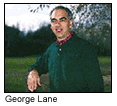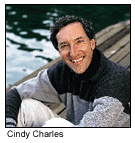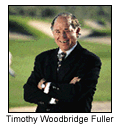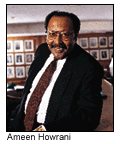 He grew up in Western Montana in the small lumber town of Superior -- a place that seemed a jillion miles from nowhere and 65 miles from the closest course. So when Paul Caruso Jr. decided to take up the game around the age of 10, he had no choice but to design his own course. Well, two holes.
He grew up in Western Montana in the small lumber town of Superior -- a place that seemed a jillion miles from nowhere and 65 miles from the closest course. So when Paul Caruso Jr. decided to take up the game around the age of 10, he had no choice but to design his own course. Well, two holes.
Caruso cut two cups into the ground at the neighborhood park across the street from his house, tossed down a ball and played away. Around trees. Over hills. Across a path. Not a real course, but the object was the same -- get the ball in the cup.
When he looks back, Caruso wonders what it was about the game that grabbed his attention. "I don't know why I had such a fascination," he said. That he does is what is important.
The president of First Security Bank in Helena, Mont., the 47-year-old Caruso is entering his 11th year as a USGA committeeman. His service on the Green Section Committee and Sectional Affairs Committee, along with his involvement in the Montana State G.A., has taken him all over the country.
Caruso had been a casual player until 1986 when a friend invited him to work at the U.S. Open at Shinnecock Hills. A few months later, Caruso attended a Rules of Golf seminar and then became a member of the Green Section Committee. From there, he became a member of the Sectional Affairs Committee, where he was involved in planning what became the 1994 Montana double -- the U.S. Girls' Junior at Meadow Lark Country Club. in Great Falls and the U.S. Amateur Public Links at Eagle Bend Golf Course in Big Fork. Through a scheduling twist, they were played the same week and, ironically, Caruso's oldest daughter Amy qualified for the Girls'.
"We had worked so hard to entice the championships to Montana," Caruso said. "That was the proudest week of my life (with Amy playing). Obviously, I wasn't going to miss that. But when she didn't qualify for match play, we packed up and drove a couple hundred miles to the Public Links, where I refereed a couple of matches."
Although he doesn't have as much time to play golf as he would like, Caruso still enjoys playing with his
father, Paul Sr., who is active in the Montana Senior G.A., and daughters Amy and Jill. His wife, Lenette, does not play but supports the others.
"The great thing about the sport is golf transcends age," he said. "You just go out and enjoy the sport."
-- Melanie Hauser
 For Merton Goode, golf has always been a family affair. Growing up in Flint, Mich., he spent countless days at Atlas Valley Country Club playing with his father, Ted, and older brother and sister. Ted, and his brother, Michael, each won four club championships, while Merton won three.
For Merton Goode, golf has always been a family affair. Growing up in Flint, Mich., he spent countless days at Atlas Valley Country Club playing with his father, Ted, and older brother and sister. Ted, and his brother, Michael, each won four club championships, while Merton won three.
"Golf was really the center of our lives," said Goode, 48, a pediatric anesthesiologist at Shriner's Hospital in San Francisco. "I started playing about age 3 or 4 and always tagged along. My dad was a good player and a big inspiration."
After finishing medical school at Michigan State, Goode migrated to the Golden State in 1976 and worked at the University of California-San Francisco. He quickly got hooked on the area, the weather and year-round golf.
For the last 12 years, Goode has worked at Shriner's Hospital, a world-renowned facility that specializes in treating children with serious physical handicaps. Goode finds the job rewarding and gets great satisfaction helping the children. It also provides him with a daily reality check.
"It's not heartbreaking," he said. "All of these kids are handicapped or in a wheelchair, but every one is upbeat. We're helping everybody get back to normal."
Goode still maintains a Handicap Index in the low single digits at Lake Merced Golf and Country Club in Daly City. He not only is a three-time club champion, but in 1991 he was medalist for a U.S. Open local qualifier.
During the last two years, Goode has served as chairman of the committee heading Lake Merced's course renovations. Working closely with architect Rees Jones, Goode has a new understanding for the design, building and restoration of golf courses. "That's been a wonderful experience," he said.
Since 1994, Goode has also been active with the Northern California Golf Association, where he currently serves as chairman of the Membership Committee.
At the urging of then-USGA president C. Grant Spaeth, a local attorney, Goode first became involved with the USGA in 1990 when he served as general chairman of the U.S. Junior Amateur at Lake Merced.
Goode hopes to stay involved with junior golf. Considering his background and occupation, it would seem to be a good fit. "That," he added, "would be kind of a natural for me." -- Mark Soltau
 Fred Hickle remembers the roundabout way he got involved with the USGA. "I was fortunate to have been taken under the wing of Dr. Ed Updegraff," said the 50-year-old Tucson, Ariz., attorney. "Here's what a nice guy Updegraff is. It was back in 1970, and I had just moved to Tucson and was enrolled in law school. Now I'm a complete stranger, mind you, and I call up Ed and ask him where I should play golf in Tucson.
Fred Hickle remembers the roundabout way he got involved with the USGA. "I was fortunate to have been taken under the wing of Dr. Ed Updegraff," said the 50-year-old Tucson, Ariz., attorney. "Here's what a nice guy Updegraff is. It was back in 1970, and I had just moved to Tucson and was enrolled in law school. Now I'm a complete stranger, mind you, and I call up Ed and ask him where I should play golf in Tucson.
"He told me to meet him at Tucson Country Club at 5:30 that day. Later that evening I asked him what club I should join, and he said, 'Right here.'"
Hickle might not hold Updegraff's credentials on the golf course. After all, few people ever capture the U.S. Senior Amateur, as Updegraff did in 1981, and finish runner-up the following year. But Hickle has a solid game. His current Handicap Index is an impressive 1.7, and he's won the Tucson City Championship and has been crowned club champion at Tucson Country Club on five occasions. "It sounds impressive, but five times pales against Updegraff's 27 times," Hickle chuckles.
Raised in Mahomet, Ill. (about 10 miles from Champaign), Hickle's love for the game began while working in Lake of the Woods' pro shop in Mahomet, "doing everything from taking tee times to making sandwiches to
watering the greens at night."
After graduating from the University of Illinois in 1969, he journeyed to Tucson, where he graduated from the University of Arizona's law school in 1973, setting up a civil practice he still maintains today.
Hickle's interest in the USGA came through a series of relationships that included Updegraff, former Arizona G.A. officials Al Birmingham and John Riggle, and former USGA president C. Grant Spaeth. Hickle credits Spaeth, whom he met during a USGA handicapping meeting in Tucson, with getting him "interested in issues on a national level."
He joined the Mid-Amateur Championship Committee in the mid-1980s, then succeeded Updegraff on the Sectional Affairs Committee. Twice he has served on the Nominating Committee.
When he's not in his office or on the golf course, Hickle likes to spend time with his children, Abigail, 16, and Joseph, 13. He also is an avid quail hunter and fly fisherman.
Not surprisingly, Updegraff endorses Hickle's candidacy wholeheartedly.
"Fred has done so much for the Arizona Golf Association [he was president in 1989], and worked so closely with the USGA," he says. "I wouldn't be surprised if he works his way through the chairs. He has a very suitable background for the job, and he's intensely interested in furthering
amateur golf." -- Bill Huffman
 Roy Richie is a bear of a man at 6-feet-2½. When Richie laughs, it's a deep, rumbling roar, volcanic, full of mirth. "I found it easy," Richie said of the USGA's Rules of Golf test, a 100-question examination that has caused even the brightest to pull out their hair in frustration.
Roy Richie is a bear of a man at 6-feet-2½. When Richie laughs, it's a deep, rumbling roar, volcanic, full of mirth. "I found it easy," Richie said of the USGA's Rules of Golf test, a 100-question examination that has caused even the brightest to pull out their hair in frustration.
But as soon as the word "easy" passed his lips, Richie roared. "That was almost as hard as the bar exam!" he continued with a laugh. "If you're with the USGA, people expect you to know the Rules. It became a matter of pride. And I've taken the Rules class twice since I passed the test."
Richie, a vice president and general counsel for Chrysler's Automotive Legal Affairs, is the second African-American to serve on the USGA Executive Committee. Although his father played golf, Richie, while growing up in Buffalo, N.Y., didn't pick up the game. It wasn't until he was into his business career in New York City that he got into golf.
He had a 19 Handicap Index when he was appointed the USGA's general counsel, an ex-officio position, in 1992. Now he carries a 12 at Detroit Golf Club and Bloomfield Hills Country Club.
As USGA general counsel, Richie would play his Saturday morning golf game and then spend the rest of the day at his Chrysler office, working on USGA legal affairs. Thick files in a storage cabinet in his office attest to a host of legal matters.
"Frankly, I didn't know much about the USGA before I was appointed general counsel. I thought that would be a nice thing to do. I didn't realize how much lawyering it would involve."
Richie has also served on the Amateur Status and Implements and Balls committees.
Richie's interests are minority and public golf and he serves as chairman of the board of the Hollywood Golf Institute in Detroit. Founded by Selena Johnson -- her nickname is Hollywood -- the institute not only teaches inner city youngsters how to play golf but how to live life. Richie hosts four to five Rules sessions on Saturdays at his house for up to 40 youngsters.
"I've never seen a more heartfelt person than Selena," Richie said. "She not only is involved with the kids, she's involved with the parents, with golf etiquette, with the Rules, how to behave, how to build a positive self-image in the context of doing something that's fun. She helps the whole family." -- Jack Berry
